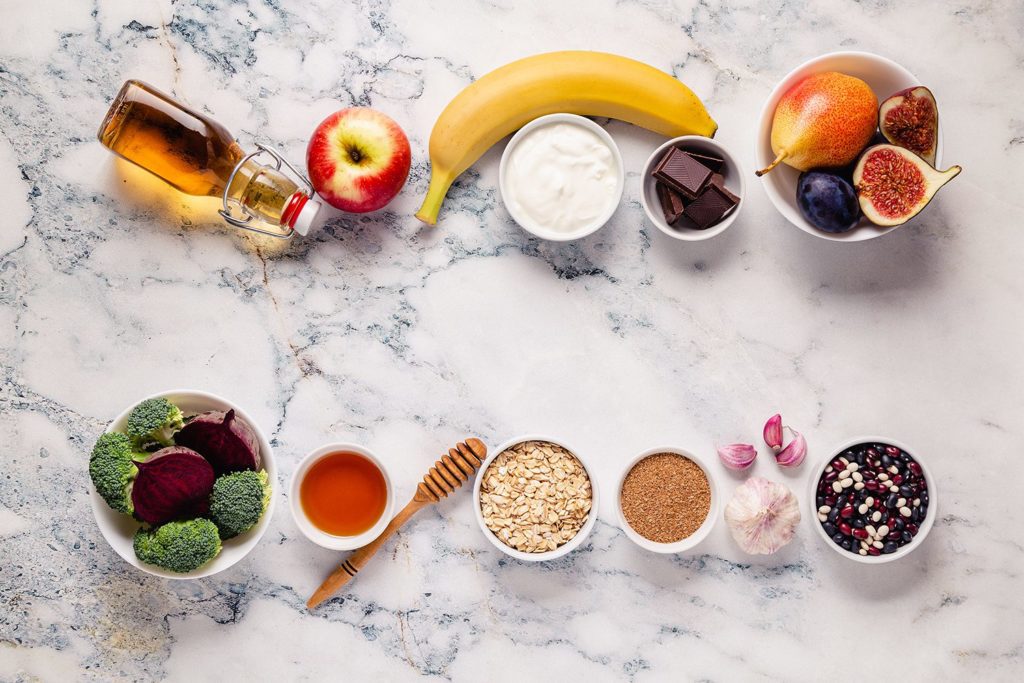
Products for healthy bowel. Natural food for gut. Top view.
Here’s a few ways how your gut microbiome affects your weight.
- They change how much energy you get from your food. Some people “waste” a lot of calories from their food because they have gut bacteria that are really inefficient.
- They affect inflammation. Inflammation drives fat accumulation in ways that are too complicated to go into detail about here, but here’s a whole paper on it if you’re interested.
- They affect feelings of hunger and fullness.
- They affect insulin sensitivity and metabolic health.
So if you’re trying to lose weight, you really want all these things on your side. Here are 6 ways to make that happen:
1. Get enough sleep
Sleep deprivation is one of the worst things you can do for your gut bacteria. Partial sleep deprivation leads to a bunch of changes in the gut bacteria that are associated with different metabolic problems and results in lower insulin sensitivity.
For example, shift workers sleep for less time on average, their gut bacteria are disturbed, making them more susceptible to weight gain and metabolic disease. Long story short: if you want your gut on your side for weight loss, go to bed.
2. Intermittent Fasting can help
The bacteria that live in your gut have a circadian cycle – different species are more prominent at different types of day. In obesity, that cycle is blunted. (If that sounds familiar, it might be because the circadian rhythm of the hormone cortisol is also often blunted in obesity). But it turns out you might be able to get the circadian gut cycle up and running normally again with some clever food timing.
The time-restricted feeding can partly restore the normal circadian cycle of gut bacteria, especially species involved in metabolism. And it helps reduce body fat percentage. Overall, there are all kinds of other benefits to intermittent fasting, or at least not eating a lot of junk food at night. It might be worth considering as an addition to your weight-loss plan.
3. Eat a Variety of Vegetables
Fiber is food for your gut bacteria. Whatever types of bacteria you feed, those are the types that will grow. So if you’re always eating the same type of fiber, you’ll get a fairly limited range of gut bacteria. Unfortunately, bacterial diversity is probably best for weight loss, and one of the best ways to get there is to eat a wide variety of fiber types.
4. Be Consistent About Your Diet
You can put people on any kind of extreme diet and watch their gut bacterial composition go crazy. But the short-term changes don’t last. Gut bacteria are remarkably resilient and always happy to go back to “normal”. This means that cultivating healthy gut bacteria takes consistency. Whatever diet works for your gut, eat that way consistently and regularly. It takes a while to get your gut bacteria to recognize something as the “new normal.”
5. Move Your Body
There are all kinds of reasons why exercise is good for you. It’s great for weight loss even though it doesn’t burn a lot of calories – burning calories isn’t the point. But one of the many reasons why exercise is helpful is that it makes your gut bacteria happy. There’s not a lot of research studying this in humans – mostly just this study finding that exercise is associated with greater microbial diversity in the gut, which is great, but it’s one study and it’s just proving an association.
6. Take a Probiotic with Lactobacillus
Probiotics basically add some healthy bacteria to your gut. There’s an enormous range of probiotic species available in supplement form, but research suggests that Lactobacillus strains are probably the ones to look for. Those are the probiotics that get results like reductions in body weight, and more importantly, body fat. Or better cholesterol profiles in people with Type 2 diabetes.
As the name suggests, Lactobacilli are mostly associated with fermented dairy products, but you can get them in dairy-free probiotic supplements, too.




